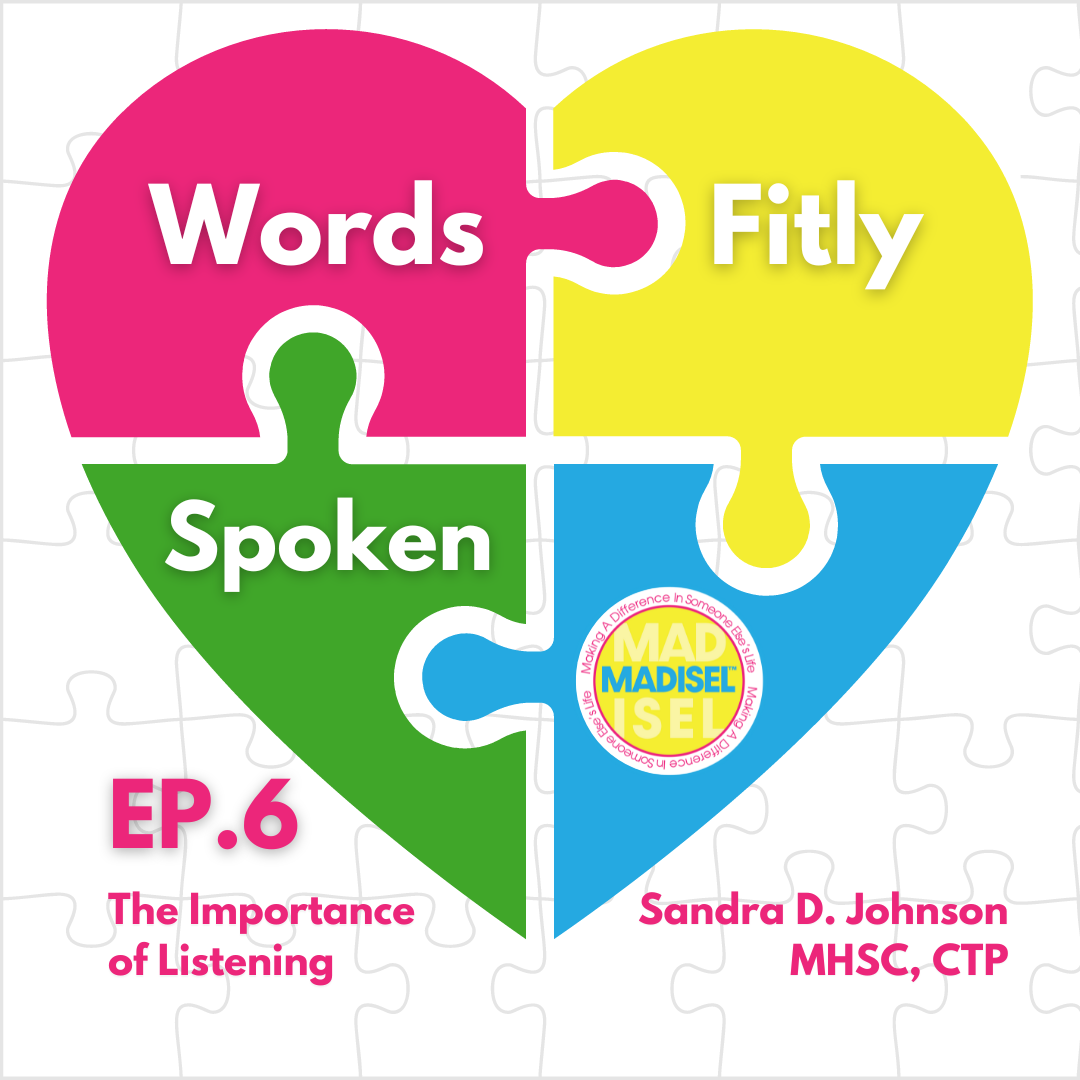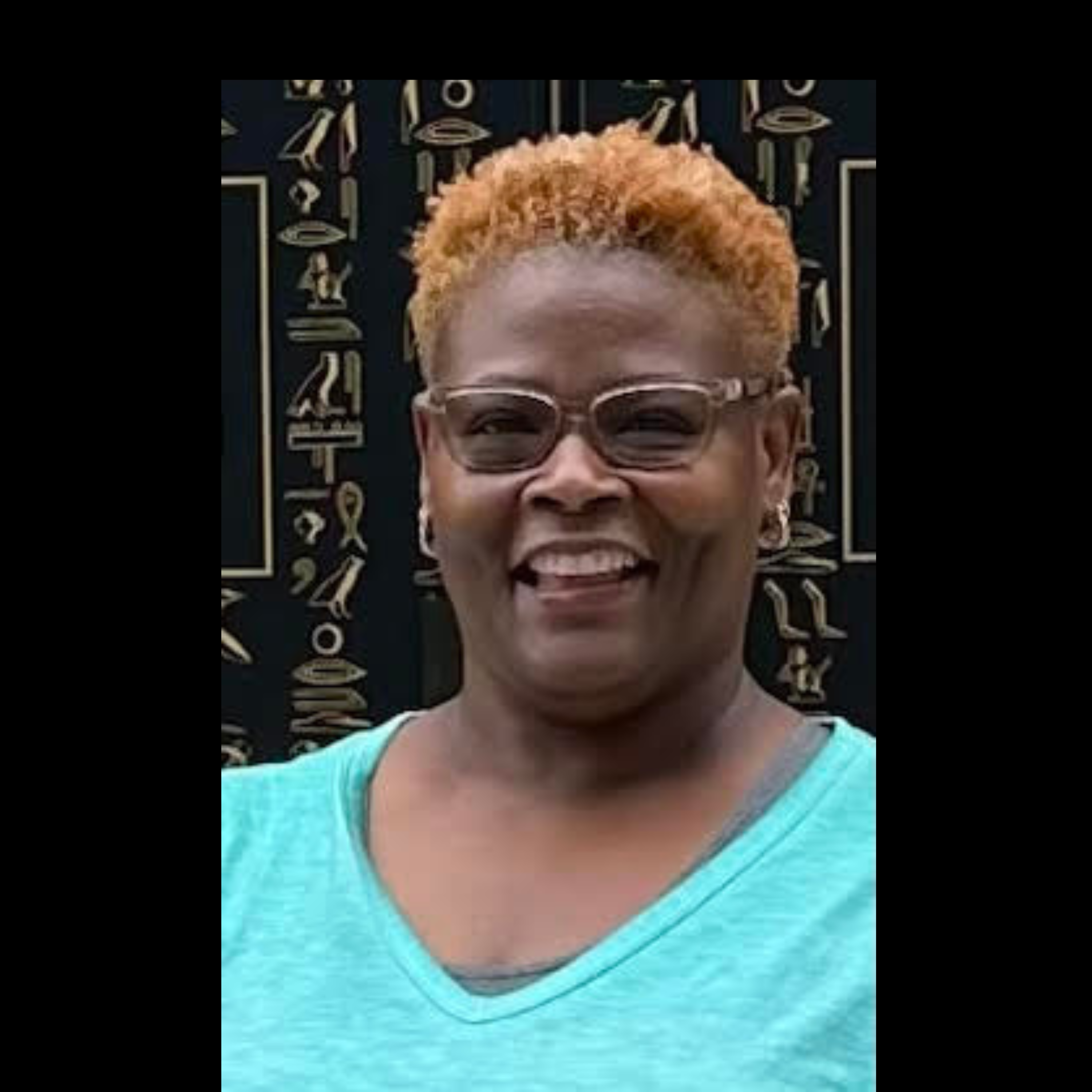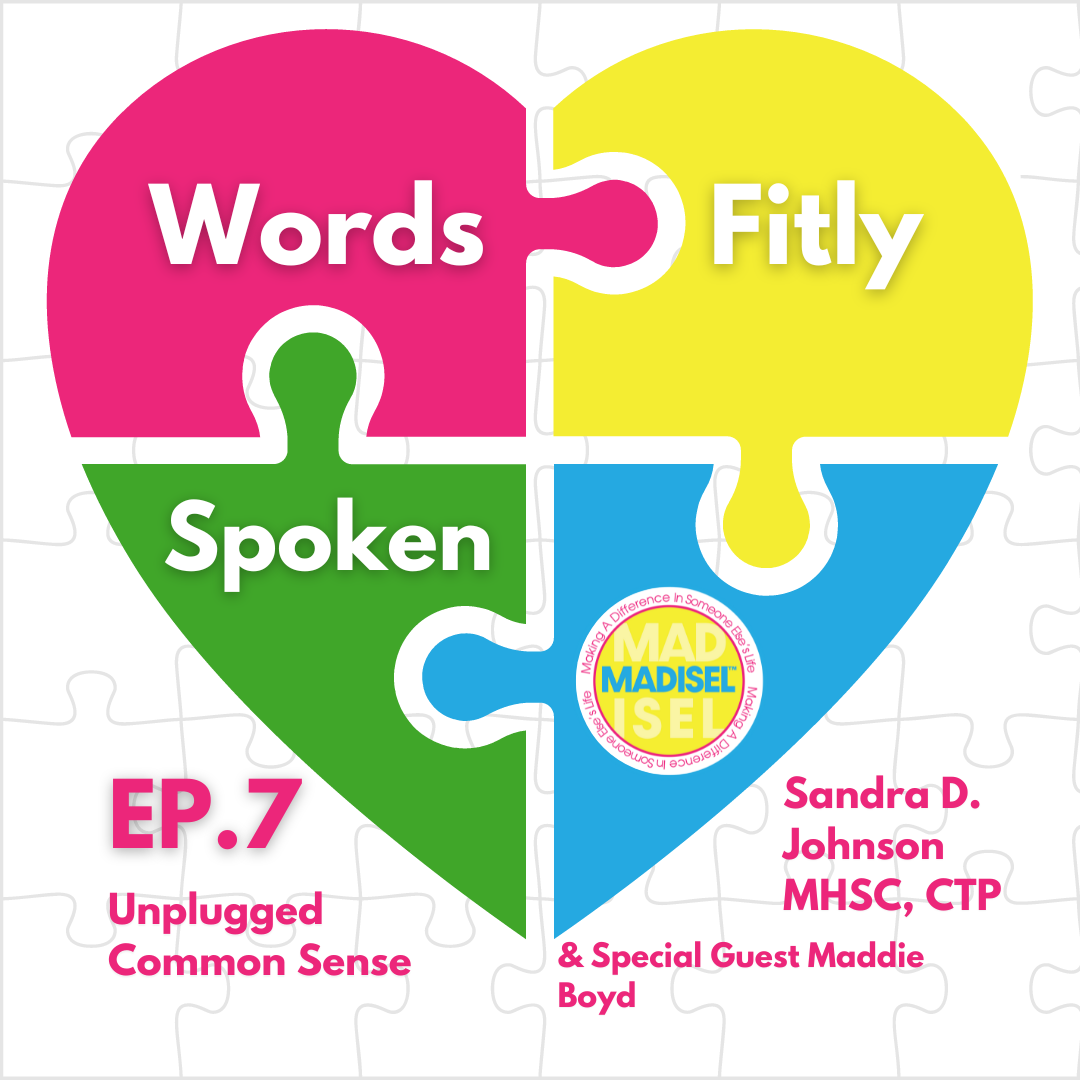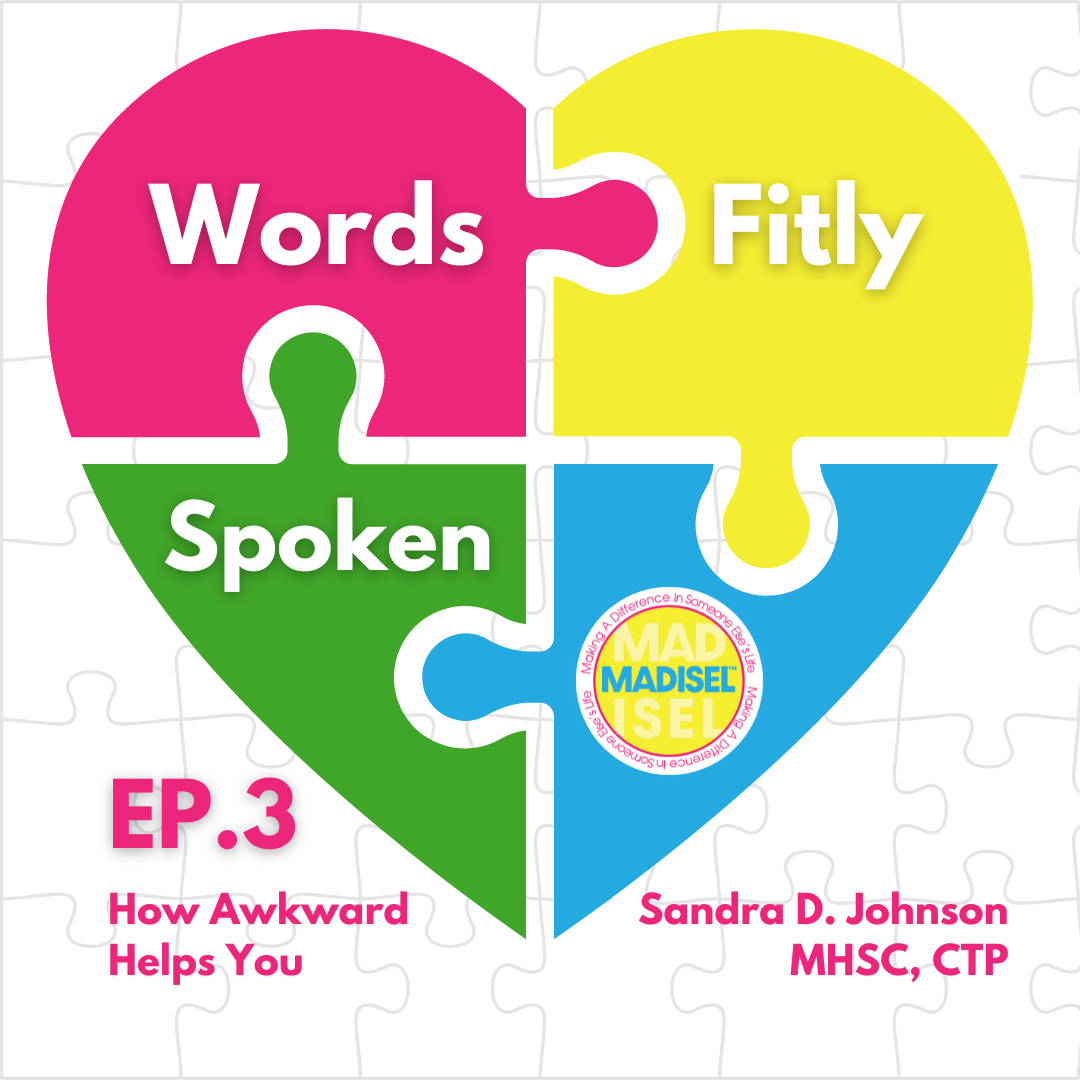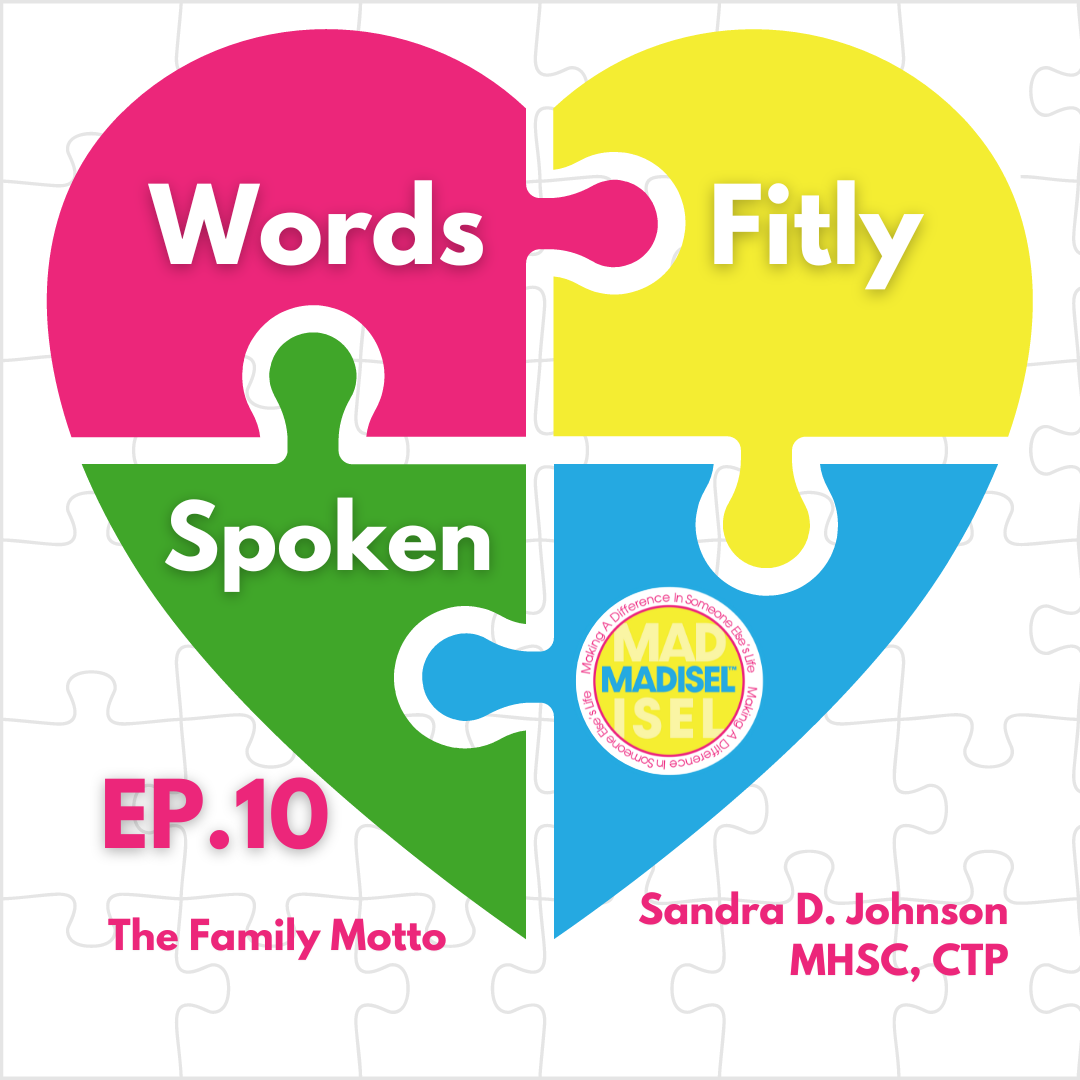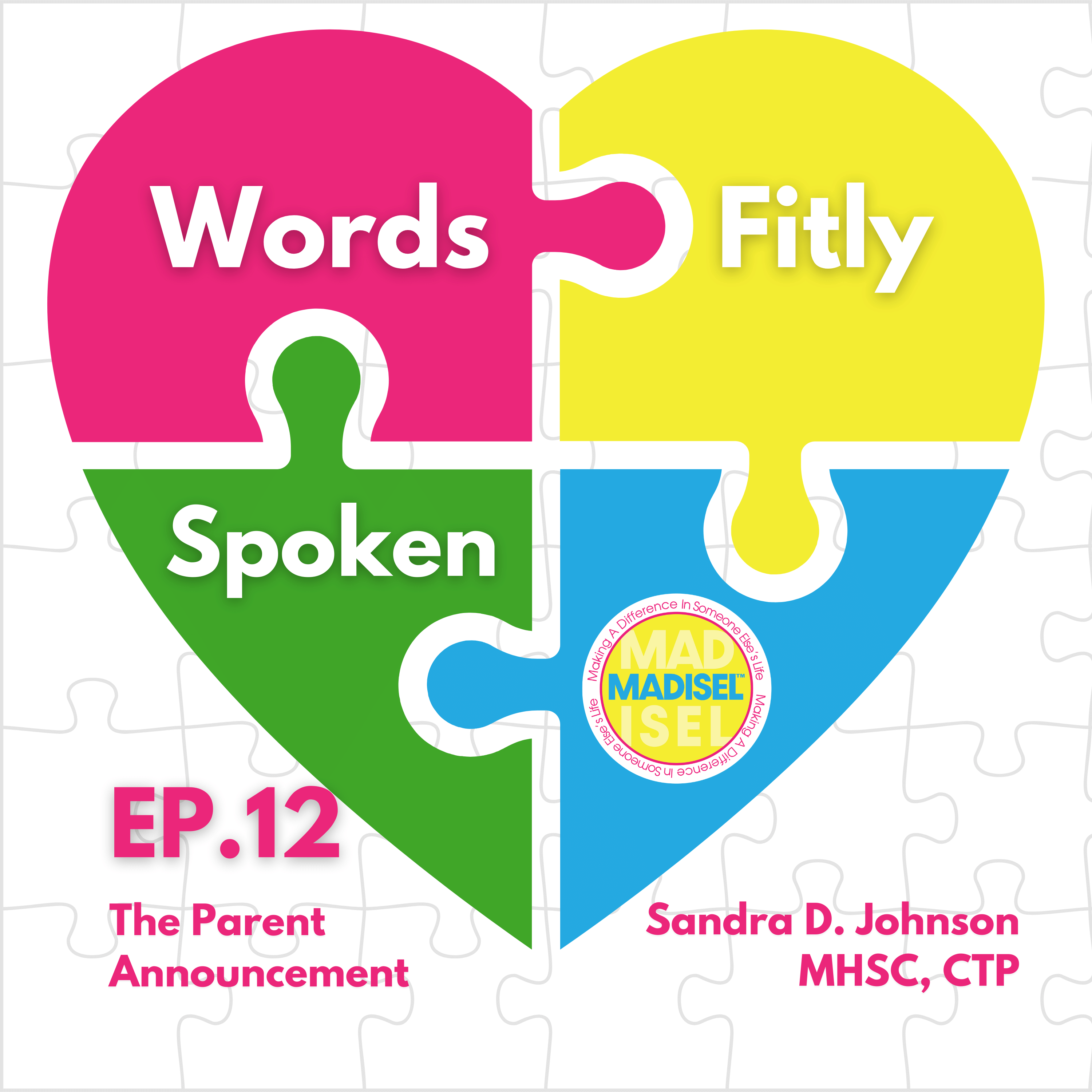We all need to strengthen our listening skills. Every person wants to be heard in every relationship. Listening demands engagement and intimacy. Listen for great strategies.
View Full Transcript
Episode Transcript
Welcome to at MADISEL Coach and MADISEL TV's Words Fitly Spoken podcast. Hello there. I'm Coach Sandra, and I'm the host of Words Fitly Spoken podcast. Words Fitly spoken are words spoken at the right time for your encouragement and enrichment. On this podcast, we will deal with emotional and mental wellness by talking about the conflicts we have in our everyday relationships, whether at home, work, school, and the community.
Stop in to hear some helpful words that create awareness about your emotional health. Hey everybody, welcome back. Thanks so much for coming back to at MADISEL coach at MADISEL tv. So let's talk about listening. What? Listening. Yep. Listening. We all need to listen. A lot of things that I find that doesn't go well.
Conflicts and it adds more fuel to a fire is when someone feels like they're not being listened to. They don't feel heard. That's usually the phrase I didn't feel heard. It's important. It's an important thing. So I don't want us ever to take that statement lightly. If someone's not feeling heard, um, it can be attached to their value system, it can be attached to their emotions and uh, they.
Really are feeling, um, not valuable. They feel discredited. Uh, they feel belittled. So listening to someone is very important in every type of relationship. Our work relationships, our school relationships, our family relationships, even relationships with ourself listening is so important. So, It's vital is what I like to say.
Uh, you have to listen with your whole being, your whole self, right? Every human requires get this. We require this. You require to be seen, heard, needed, and acknowledged. Research shows us that we all require that we're seen, we're heard, we're needed, and acknowledged. Now I need us to remember this. This has no age limitation on it.
So from childhood, really from infancy, let's go ahead and make it basic as possible. From infancy to death. We all wanna be seen, heard, needed. And acknowledge. Let me throw this extra piece in. For our parents who feel like they need to do everything around the house, they need to do everything around the house.
And they'll say these phrases to me. 'cause I am a family coach and I hear these statements. Well, we don't require them to do much at the house. That's really not a good thing. I know we're talking about listening, so I need you to listen to me on this. Um, That phrase, I don't require them to do much is actually bad, because what you're saying is they're really not needed in the family.
That's how they interpret it. So I'm not telling you that your children or the other people in your home need to do everything, but they have to be a part of the home to feel like they're a part of the family. I'll say it again. Make sure you're listening, please. Children have to feel like they're a part of the home, so they feel that they're a part of the family.
In other words, helping out chores, doing, uh, having them cook meals, age appropriate, having them, uh, build things, put things together, turn things in, uh, make sure this was done correctly. Double check another chore. You do something and say, Hey, can you check behind me? Make sure I did that. I know that may sound so out of the norm, but it is necessary to feel seen and heard and needed and acknowledged.
Hey son. This is important to the family. We need you to take care of this laundry. Hey, daughter, it's important to the family. We need you to take care of the dishes. Hey, I'm gonna make sure I take care of this. So we're all connected, we're all listening. We feel seen, heard, acknowledged, and needed in a family.
More points to make about listening. Thank you for going there with me in that little piece. Listening goes beyond the hearing that you do with your ears. Again, listening goes beyond your ears. As I said earlier, it's about your whole being. It demands engagement, listening demands, engagement of all of your senses.
Really? Yes. All of your senses are a part of you listening your emotions. They're a part of the listening experience. Hey, get this. True. Listening is connected to intimacy and you, if you've heard this or not, intimacy. Another way to look at that word is into me. See, so true listening is connected. To li to intimacy, the lack of listening will produce brokenness, power struggles, a lack of interest, dysfunction, stress, hostility will happen because of the lack of listening.
Anxiety is welcome when there's no zit, when there's no listening. Neglect happens, disconnect will happen, hurt, depression, and more of the same. A lack of listening creates intolerance. It communicates misunderstanding. A lack of listening can also support suicide. It's important to make sure we're listening.
Here's some strategies to improve your listening strategies for listening improvement. I challenge you to have a listening session with someone else, right? So it could be your family unit, it could be you and a partner or spouse. It could be a friend, uh, your connected with, just have a listening session.
What do I mean by that? That's like, you know, you take 10 minutes to purposely, there's a word to purposely listen to each other. It means you're being intentional. I'm going to intentionally spend this 10 minutes in a listening session with you. Another strategy to improve your listening is to make a request, not a demand.
Here's an example of what I like to use. Will you listen to me with your eyes? Will you listen to me with your eyes? Another strategy is check the volume and the content of what you are saying. You have to do a honest evaluation on that one. Sometimes we're talking too loud. Sometimes we're yelling.
Do a volume check and a content check for women, we're repetitive. Okay? We have to go ahead and own that. If in the content I have repeated myself, I should not be surprised that someone doesn't call me a nag. It means I'm repetitious. I keep saying the same thing over and over and over. Uh, it can be annoying.
Another improvement, we're gonna reject any traditions that are not helpful to your present day. Family reject the traditions that are just not helpful in this century. We're living in those things. Were good in that a hundred years ago, 40 years ago. They just don't fit. A digital era that we live in now, be okay with that.
Your ancestors won't be upset. Hey, you gotta remember with this one here, this strategy. It's a ba, it's a math strategy and an anatomy strategy. You have two ears and one mouth. Two ears and one mouth. We must listen more than we speak. Yes, women. I'm talking to us. Another strategy is this. We're going to have a clean slate.
Apologize for the past failures, and look at rebuilding something new. So you wanna apologize for any past failures you've had with communications, with connection, disconnection. Apologize for it and create something new. Another strategy is to be present. That sounds real easy, but most times our mind is either on the past or we're thinking about the future.
So we are hardly ever living in the present. Be present. You have to practice, be present. That's being right here, right now.
Another strategy, our last strategy of the day. Is to accept help from life. Coaches, counselors, other support professionals. We have resources out there. Use those resources. Last thought here, if you want others that you engage with to feel like they're being heard, we must strengthen our listening skills, listening.
Can only happen when you believe that you don't already have the answer.
A true listener must be humble to have true relational intimacy. Thank you again for stopping by. We were talking about listening today, and we encourage you to follow us on all of our platforms at MADISEL Coach. MADISEL TV. We want you to like this, comment on this. Subscribe to the channel and share it.
Let other people know we are out here. Thank you. Bye-bye.
